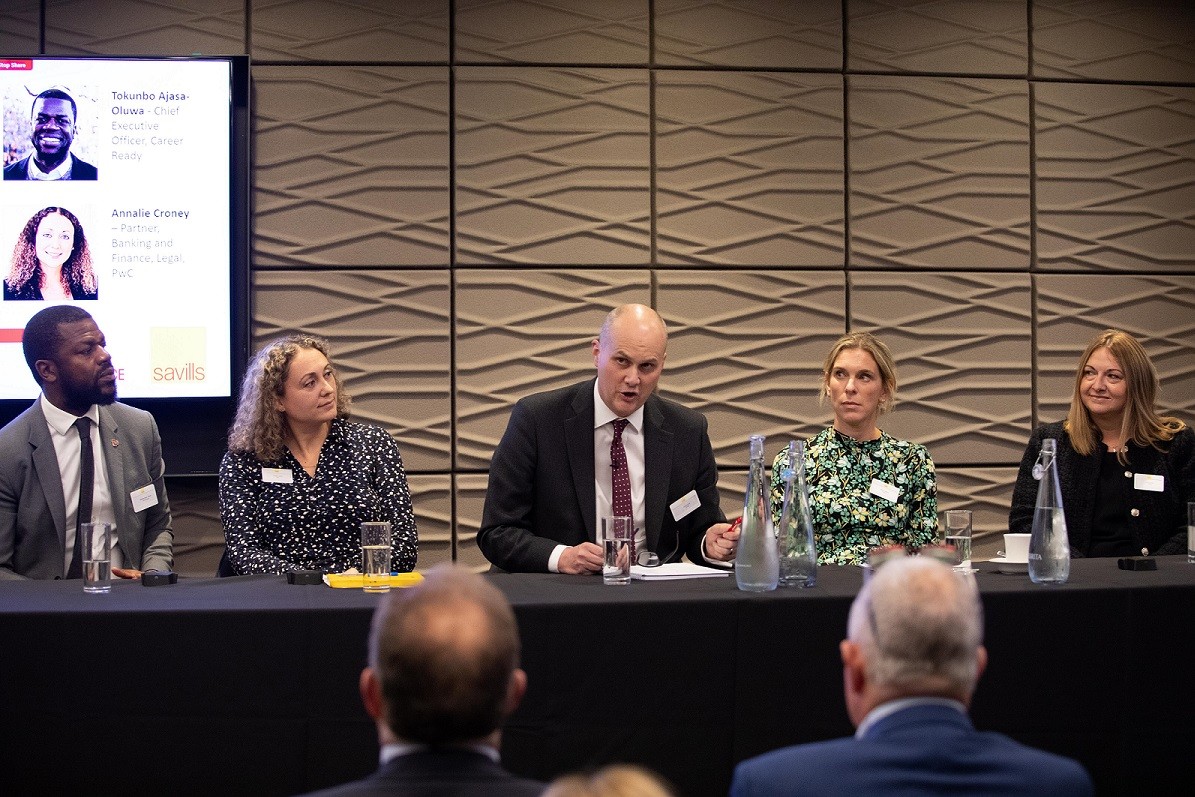By joining Real Estate Balance’s email list, you agree to receive email updates from time to time about organisation news, events being held and information about our partners in accordance with the terms outlined in our privacy notice, which you can read in full here.
Sign upHidden workers in real estate
Real Estate Balance and Savills recently held an event on hidden workers in real estate and its associated sectors to discuss how our industry can elevate policies and practices for agency workers, night staff and those who rely on statutory sick pay.
The panellists, listed below, also discussed their company’s culture around hidden workers and how organisations can shine a spotlight on their vital work.
- Sam McClary – Editor at EG (Chair)
- Michael Blake – Associate Director, Social Value at Savills
- Emma Kosmin – Senior Campaigner at The Centre for Progressive Change
- Katrina MacKay – UK Board Director at Savills
- Mark Tyson – Head of Asset Services, Real Estate at Legal & General Investment Management
The discussion started with an explanation of a two-tier working system and gaps in company policies which means that some workers do not have access to full employee benefits.
Katrina highlighted that equal sick pay had recently been introduced across Savills’ entire workforce and that the gap that still exists elsewhere which could leave some workers unable to afford to take time off for basic check-ups and other medical appointments.
Savills staff also have access to online GP services and an annual health check-up, with the rationale being a people-centred approach and progressing a more inclusive workplace environment.
Building on this point, Emma spoke about the Safe Sick Pay campaign which aims to reform the UK's sick pay regime. Many people in the workforce rely solely on statutory sick pay, and women are twice as likely to lose out on sick pay than men. Indeed, 60% of people have reported working through sickness because they could not afford to take time off.
Michael discussed the relationship between a company and its supply chain in our industry and the stark wealth and health divides present in various boroughs across London.
Mark added that senior leadership do not always understand the full impact of procurement decisions. Moving a cleaner’s shift from 5am to 7am, for example, could make a real difference to their commute to work and make it easier. Consequently, this could have a positive impact on their family lives.
Occupations such as bus driver, security officer and cleaner have a life expectancy which is significantly less than someone working in an office job.
Mark Tyson
Emma pointed out that some people may not realise their contract only includes statutory sick pay until they become unwell and need more support from their employer. If someone has their salary fall to a quarter of their regular pay after receiving a cancer diagnosis, it creates stress and debt which can only hinder recovery. She called for change at a Government level. At the moment, there are 250,000 workers with a cancer diagnosis without enough money to cover food and rent.
The panel agreed that although some managers may be concerned about covering absences and resultant increasing workloads on others, if workers have access to healthcare they return to work more quickly – the long-term benefits for companies speak for themselves.
Savills’ absence policy enables them to provide their employees with the support they need alongside a return to work conversation after a long period of leave.
The panellists also discussed how our current system can default to treating workers as being unreliable until they prove otherwise. They agreed that this structure needs to be reversed.
Sam asked where the responsibility lies for changing this culture and suggested that events like these increase visibility of this currently underdiscussed issue.
Michael pointed out the connectivity between health outcomes and sick leave and how this can have an impact on wider socio-economic and community wealth building. Providing sick pay could provide someone the time and opportunity to treat an ailment whilst income is still coming into the household.
Mark said it would help if the companies that are engaged with the Living Wage campaign also ensured their sick leave policies are adequate. Companies must also influence their service partners and supply chains. He advocated for terminating relationships with firms not sufficiently committed to employee wellbeing, as L&G has done.
Katrina pointed out that talent should not be attracted to a company on the basis of receiving sick pay. It should be seen as a given and a necessity.
Mark said that there is an unprecedented amount of people on long-term sick leave. However, with reliable sick pay policies, facilitating short term absence, long-term sick leave is likely to decline and L&G are already seeing evidence of this on their portfolio.
The panel had concurred that there are workers in this country who are not being treated fairly. They agreed that sick pay should be consistent as it helps create a level playing field, where there is no longer a two-tier system.
Attendees had the opportunity to ask questions of the panel, which stoked conversation around pushback at the customer level to sick leave, how to ensure values are implemented across the supply chain and breaking the taboo around mental health days.
The panel answered that outreach and education was important, as well as making sure these conversations are happening at the employee level. Workers must be aware of what benefits are available to them.
Emma mentioned some steps that individuals can make to create change, such as getting involved in the Safe Sick Pay campaign, signing up to the Centre for Progressive Change’s newsletter and writing letters to MPs and media organisations to call for change. A template letter to contact MPs can be found here.
The Safe Sick Pay Campaign is always keen to hear from business leaders that are either interested in going further or may wish to be recognised for doing this already. If you wish to connect with the Campaign as an individual or organisation, please email Caroline Reilly on caroline.reilly@centreforprogressivechange.org.
We are thankful to Emma, Katrina, Mark, Michael and Sam and Ema Saunders and everyone at Savills and all who attended and participated in this vital and educational event.


